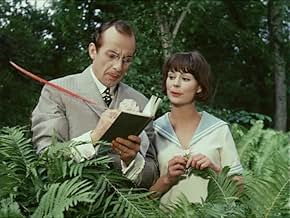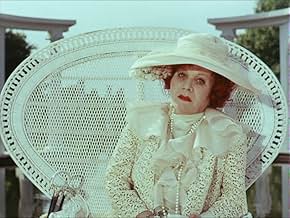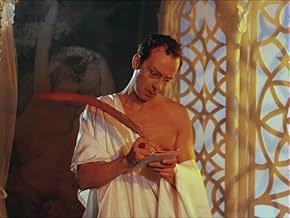Para Não Falar de Todas Essas Mulheres
Título original: För att inte tala om alla dessa kvinnor
AVALIAÇÃO DA IMDb
5,4/10
2,7 mil
SUA AVALIAÇÃO
Adicionar um enredo no seu idiomaA critic blackmails a famous musician with his biography filled with the revelations of many of his women.A critic blackmails a famous musician with his biography filled with the revelations of many of his women.A critic blackmails a famous musician with his biography filled with the revelations of many of his women.
- Direção
- Roteiristas
- Artistas
- Prêmios
- 1 indicação no total
Jan Blomberg
- English Radio Reporter
- (não creditado)
Lars-Owe Carlberg
- Driver
- (não creditado)
Axel Düberg
- Man in Black
- (não creditado)
Doris Funcke
- Waitress
- (não creditado)
Göran Graffman
- French Radio Reporter
- (não creditado)
Yvonne Igell
- Waitress
- (não creditado)
Ulf Johansson
- Man in Black
- (não creditado)
- Direção
- Roteiristas
- Elenco e equipe completos
- Produção, bilheteria e muito mais no IMDbPro
Avaliações em destaque
This comedy, most notable for being Bergman's first film in color, is often considered one of his worst. I went into it with very low expectations, glad that it was just 80 minutes long. Thankfully, it's not nearly as bad as its reputation. It's minor Bergman, for sure. It's main crime is that it thinks it's much funnier than it ever is. That can be annoying, but, really, the film isn't exactly unfunny. Personally, I think Bergman only did comedy right once, with Smiles of a Summer Night, and even that one I don't think is amongst his best work. Simply put, Bergman excels at tragedy, and his comedy can feel forced. This film revolves around an art critic (Jarl Kulle, Bergman's most mugging actor) who comes to write a biography of a famous cellist at his palatial estate. The cellist (whose face never appears on screen) is a philanderer, surrounding himself with women of various ages (including Bibi Andersson, Harriet Andersson and Eva Dahlbeck). Kulle starts a fling with Bibi Andersson, and soon discovers that one of the wives or mistresses is attempting to murder the cellist. The Bergman film this reminds me most of is The Devil's Eye, which also stars Kulle (if I recall correctly, that one is slightly less comic). The color cinematography is actually quite excellent. Bergman didn't film again in color until Cries and Whispers. This is available on Hulu Plus.
Felix is a very happy fellow, none more so when he's fiddling with his cello, of which he has a few, perpetually in a queue, makes Cornelius a little green, although he's yellow.
It's a bit of fun, but not funny and there's little pun, plus it hasn't aged well so move on, do not dwell.
Plenty of Bergman stalwarts, including the gorgeous Bibi Andersson, the engaging Harriet Andersson and the delightful Eva Dahlbeck however, even they can't save this, as the story's as daft as a brush and it soon becomes a bit of a chore, as the end seems to extend to a point where you stop caring, and start looking for the door.
It's a bit of fun, but not funny and there's little pun, plus it hasn't aged well so move on, do not dwell.
Plenty of Bergman stalwarts, including the gorgeous Bibi Andersson, the engaging Harriet Andersson and the delightful Eva Dahlbeck however, even they can't save this, as the story's as daft as a brush and it soon becomes a bit of a chore, as the end seems to extend to a point where you stop caring, and start looking for the door.
Boy, I'm so upset right now. Two days ago, you would ask me about the directors who had never disappointed me and the name of Ingmar Bergman would have immediately sprung to mind. But it was before I watched "All These Women".
Two years ago, I wrote a review of "Pierrot le Fou" and I used Bergman's negative statement against Godard as an alibi to my own hostility, if even the director who was the epitome of intellectual and artistic cinema found Godard to be an empty shell, I could rest my case. Yet, "All These Women" makes "Pierrot le Fou" look like "The Seventh Seal" and I couldn't believe the man who used such a bold critic against Godard could indulge to the same farcical tendencies than his rival, but failing as miserably. No matter how good the intentions were.
Finally, many many years ago, I wanted to discover Fellini and started with "8 ½" an unwise choice that made me postpone my exploration of the Italian director's work for one year and a half and made me discover Bergman instead. It's not until I saw the neo-realist films of Fellini that I could appreciate his slow evolution to poetic realism and then surrealism in the 60s. But if the first Bergman movie I saw was that one, I guess I wouldn't be the fan I am today, any film would do for a discovery but "All These Women" is a film that transcends my perception of a bad movie, quite a disturbing experience for someone who built such a high esteem on Bergman. It's not that it's bad, I just don't get how he could make something that bad.
Obviously, the film is meant to be a farce. The little inter-titles carry a certain edge and even mention the censorship that still prevailed, Bergman dodges them with fun artistic licenses, it's funny though because one of the reasons I wanted to watch a Bergman film is that I had just enjoyed the film "Tom Jones" and I've had enough laughs, I wanted to forget about its zany tone and its slight overuse of comical tricks, I wouldn't have thought that Bergman, of all the directors, would have kept me on the same scenery. Somewhat I was amused and even thrilled during the first five minutes, yes, I was determined to enjoy the film.
"All These Women" opens with the funeral of a famous cellist and seven of his women, mistresses and concubines come to pay their respect, each one delivering the same line with a tone that reveals something of her personality, but the camera is so far and the tone so detached that I'm not sure they wanted to know who is who or even that we're supposed to care. Three women would have been enough but seven?! I was glad I could spot the two Andersson, Harriett and Bibi, who had just left us... but I couldn't care much for the others.
It's even more incongruous since the main character is a critic named Cornelius, and not the cellist himself. Cornelius hovers from one room to another, each sequence being the sorry excuse for a gag that supposedly imitates the type of silent comedy used in Benny Hill sketches: jazzy music, fast-paced chases and all, but none of them really work. The first visual essay is the scene involving Cornelius's struggle with a statue and no mater how hard he tired, it didn't get one single laugh from me.
And I guess it's pretty normal since I never expected Bergman to make me laugh, it's one thing to imitate Fellini, but the film doesn't come close to anything the Maestro had done before. Maybe after a streak of existential movies questioning God, Bergman felt the use to loosen up a bit and he's quite entitled to operate a change of tone and style, no matter how disconcerting it can be to the fans, but the result is so disapprovingly disjointed and bizarre. At the end, the film is aesthetically interesting, I suspect it inspired François Ozon's "8 Women" but in the Bergmanian canon, the best thing you can ay about it is that it's an oddity, a curiosity.
There are certainly areas where we're tempted to dig a little and find some statements about the relationships between art and criticism, or the necessity of separating the art from the artist by showing both sides of the same man, from different perspective but his. Maybe the film is deeper than it seems to be or maybe Bergman, like a deliberate hack, wanted to challenge critics' opinions and created this cinematic "trap for idiots". Maybe we'd be stupid to miss the point or to praise it... Maybe.
Still, Bergman is such a heavy director, so intellectually challenging that many of his movies demand several watching to be examined and appreciated, that I'm not sure this one is worth the time even if it's a masterpiece in disguise. I guess it takes a Bergman fan to be able to reach that film and the same Bergmanian fan to be wise enough to forget it.
Yes, sometimes, it's not about separating the Art from an artist, but at least some pieces of it...
Two years ago, I wrote a review of "Pierrot le Fou" and I used Bergman's negative statement against Godard as an alibi to my own hostility, if even the director who was the epitome of intellectual and artistic cinema found Godard to be an empty shell, I could rest my case. Yet, "All These Women" makes "Pierrot le Fou" look like "The Seventh Seal" and I couldn't believe the man who used such a bold critic against Godard could indulge to the same farcical tendencies than his rival, but failing as miserably. No matter how good the intentions were.
Finally, many many years ago, I wanted to discover Fellini and started with "8 ½" an unwise choice that made me postpone my exploration of the Italian director's work for one year and a half and made me discover Bergman instead. It's not until I saw the neo-realist films of Fellini that I could appreciate his slow evolution to poetic realism and then surrealism in the 60s. But if the first Bergman movie I saw was that one, I guess I wouldn't be the fan I am today, any film would do for a discovery but "All These Women" is a film that transcends my perception of a bad movie, quite a disturbing experience for someone who built such a high esteem on Bergman. It's not that it's bad, I just don't get how he could make something that bad.
Obviously, the film is meant to be a farce. The little inter-titles carry a certain edge and even mention the censorship that still prevailed, Bergman dodges them with fun artistic licenses, it's funny though because one of the reasons I wanted to watch a Bergman film is that I had just enjoyed the film "Tom Jones" and I've had enough laughs, I wanted to forget about its zany tone and its slight overuse of comical tricks, I wouldn't have thought that Bergman, of all the directors, would have kept me on the same scenery. Somewhat I was amused and even thrilled during the first five minutes, yes, I was determined to enjoy the film.
"All These Women" opens with the funeral of a famous cellist and seven of his women, mistresses and concubines come to pay their respect, each one delivering the same line with a tone that reveals something of her personality, but the camera is so far and the tone so detached that I'm not sure they wanted to know who is who or even that we're supposed to care. Three women would have been enough but seven?! I was glad I could spot the two Andersson, Harriett and Bibi, who had just left us... but I couldn't care much for the others.
It's even more incongruous since the main character is a critic named Cornelius, and not the cellist himself. Cornelius hovers from one room to another, each sequence being the sorry excuse for a gag that supposedly imitates the type of silent comedy used in Benny Hill sketches: jazzy music, fast-paced chases and all, but none of them really work. The first visual essay is the scene involving Cornelius's struggle with a statue and no mater how hard he tired, it didn't get one single laugh from me.
And I guess it's pretty normal since I never expected Bergman to make me laugh, it's one thing to imitate Fellini, but the film doesn't come close to anything the Maestro had done before. Maybe after a streak of existential movies questioning God, Bergman felt the use to loosen up a bit and he's quite entitled to operate a change of tone and style, no matter how disconcerting it can be to the fans, but the result is so disapprovingly disjointed and bizarre. At the end, the film is aesthetically interesting, I suspect it inspired François Ozon's "8 Women" but in the Bergmanian canon, the best thing you can ay about it is that it's an oddity, a curiosity.
There are certainly areas where we're tempted to dig a little and find some statements about the relationships between art and criticism, or the necessity of separating the art from the artist by showing both sides of the same man, from different perspective but his. Maybe the film is deeper than it seems to be or maybe Bergman, like a deliberate hack, wanted to challenge critics' opinions and created this cinematic "trap for idiots". Maybe we'd be stupid to miss the point or to praise it... Maybe.
Still, Bergman is such a heavy director, so intellectually challenging that many of his movies demand several watching to be examined and appreciated, that I'm not sure this one is worth the time even if it's a masterpiece in disguise. I guess it takes a Bergman fan to be able to reach that film and the same Bergmanian fan to be wise enough to forget it.
Yes, sometimes, it's not about separating the Art from an artist, but at least some pieces of it...
I agree that "All These Women" is misunderstood, especially if you look at it in the context of Bergman's filmography. He had just completed the "Silence of God" trilogy, one of the deepest, most serious works in the history of cinema. So, cut the man some slack and allow him his lark, his goof, his chance to riff on fans and critics and the illusion of the exalted artist (himself), before returning to his true work with his next film, the universally praised "Persona."
I also think he was a little influenced by "8 1/2" which had come out the year before, appreciating Fellini's playfulness as well as his insight into the creative process and, of course, "all these women." Bergman will always be thought of as a somewhat austere and oft despairing artist, but thankfully we have several films that belie that, like "Smiles of a Summer Night," "The Magician," and this little oddball gem.
I also think he was a little influenced by "8 1/2" which had come out the year before, appreciating Fellini's playfulness as well as his insight into the creative process and, of course, "all these women." Bergman will always be thought of as a somewhat austere and oft despairing artist, but thankfully we have several films that belie that, like "Smiles of a Summer Night," "The Magician," and this little oddball gem.
I never thought that I would have to say that but I did not like the Ingmar Bergman's film "All These Women". In spite the very pretty and delicate pink and blue cinematography and the presence of the charming and talented actresses, the movie was a mess of an attempt to create a comedy. Everything that was subtle, sensual, and charming in B/W "Smiles of a Summer Night" (1955) was missing here. First of all - the Jarl Kulle's performance as a music critic - biographer, Cornelius. Kulle was very effective and funny in "Smiles...", in "Women..." - he plays an irritating, annoying, and the worst - absolutely not funny (which is a crime for a comedy) character. If in "Smiles... the writing was a first class and sparkled, I got the impression that in "Women.." Bergman did not care or did not want to work on the script and was more interested in experimenting with colors and music. The movie looks and sounds fine - it is Bergman, after all, but that's the only redeeming qualities that I found.
4/10
4/10
Você sabia?
- CuriosidadesThis is Ingmar Bergman's first color film.
- Cenas durante ou pós-créditosThe disclaimer at the beginning states that: "Every similarity between this film and the so-called reality has to be a misunderstanding".
- Trilhas sonorasOrchestral Suite No. 3 D-dur (BWV 1068)
Composed by Johann Sebastian Bach
Principais escolhas
Faça login para avaliar e ver a lista de recomendações personalizadas
- How long is All These Women?Fornecido pela Alexa
Detalhes
- Tempo de duração1 hora 20 minutos
- Mixagem de som
- Proporção
- 1.37 : 1
Contribua para esta página
Sugerir uma alteração ou adicionar conteúdo ausente

Principal brecha
By what name was Para Não Falar de Todas Essas Mulheres (1964) officially released in India in English?
Responda































